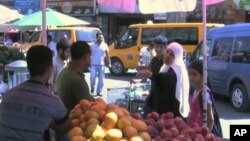Muslims around the world are observing the second week of Ramadan, the holy month of fasting from sun-up to sun-down. The month is difficult anytime for many. This year it is proving especially hard for the faithful in the Palestinian territories because of a crisis in the Palestinian Authority that administers them.
It is a hot afternoon in Ramallah. People are shopping for iftar, the evening meal that will break their day-long fast.
The nightly feasts during Ramadan strain family budgets in any year. But this year Ramadan coincides with the beginning of the school year, which is adding the cost of school supplies to the financial worries of many.
Thirty-year-old Sabah Rajah is shopping for her family.
She says prices are in-between. Some are high. Some are not too high. She hopes they will go down but, she says, that is not likely to happen at this time of the year.
The Palestinian Authority, headquartered here, is short of money. It paid its 150,000 civil servants their salaries this month, but only after they threatened to strike. It still owes them half of their salaries for last month.
Butcher Tamer Marmash says his customers are suffering. Many have loans and the banks are paid first.
He says if a civil servant’s salary is $700, he will not take home more than $100. So what can he do, Marmash says, he will steal from the people. There is no other choice.
The Palestinian Authority says its revenues cover less than half of its budget because it has not received funds from foreign donors, mainly Arab and Western governments.
Hani al-Masri heads the Political Center for Policy Research and Strategic Studies in Ramallah. He says some donors do not like the Palestinian drive for membership in the United Nations. Al-Masri says another factor in the budget crisis is continuing tension between Hamas and Fatah, the two major Palestinian political groups.
He says the split has paralyzed public institutions. One of the most important is the Legislative Council, or parliament. It was elected by the people to oversee the executive but it is not doing this. He says as a result the executive is not being monitored and this has made corruption easier and more widespread.
Al-Masri says corruption is also worrying the donors.
He says corruption has to be dealt with but the measures taken by the Palestinian Authority have been limited and usually delayed. We need every dollar we can save, he says. The end result will be more trust in the authorities from the public and from international and regional donors.
Analysts say a major step forward would be reconciliation between the rival Palestinian groups. But this has been slow in coming. And in the meantime, ordinary Palestinians struggle even more to meet their obligations during this month of sacrifice.
Funding Crisis Adds to Ramadan Hardship in Palestinian Territories
- By Scott Bobb









